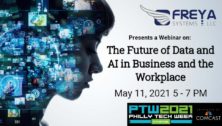A.I. in the Workplace? This West Chester Professional Has Opinions

Companies are implementing A.I. tools that claim to reduce stress, increase employee connectivity, and provide feedback. While they allegedly are supposed to make employees’ jobs easier, some professionals are skeptical, writes Danielle Abril for The Washington Post.
West Chester’s Steve Ozer, a communications director for a chemical sales agent, discussed the A.I. renaissance in the workplace.
He finds the implementation of A.I. in certain instances, such as employee safety is legitimate but finds too much monitoring is invasive and can cause distrust.
“It demonstrates a lack of trust with their own employees,” he said. “At a time when we should be building bonds with employers and employees, intrusive surveillance can lessen it or sever it completely.”
Some examples of these A.I. tools include the software company Gong which uses ChatGPT to help the sales department keep track of their clients and deals. The Pulse app by the biotech company Fierce uses devices to monitor heart rates within employees to detect stress and connect them with a chatbot or live coach.
Employment engagement platform Glue uses AI to detect disconnection amongst its employees. The A.I. monitors communications on workplace apps to detect how engaged employees are in connecting with each other.
Some employees have said that A.I. can help with efficiency in completing assignments, but others are worried about their privacy.
Read more about attitudes towards A.I. tools in the workplace in The Washington Post.
How ethics & A.I. affects employee privacy and the future of work.
Connect With Your Community
Subscribe to stay informed!
"*" indicates required fields







![95000-1023_ACJ_BannerAd[1]](https://vista.today/wp-content/uploads/2023/03/95000-1023_ACJ_BannerAd1.jpg)








































